Nest参考手册
GRAPHQL
标量
为了定义自定义标量,我们还必须创建一个类型定义和一个专用的解析器。在这里(如在官方文档中),我们将把graphql-type-json包用于演示目的。这个npm包定义了JSONGraphQL标量类型。首先,让我们安装包:
$ npm i --save graphql-type-json安装包后,我们必须将自定义解析器传递给forRoot()方法:
import * as GraphQLJSON from 'graphql-type-json';
@Module({
imports: [
GraphQLModule.forRoot({
typePaths: ['./**/*.graphql'],
resolvers: { JSON: GraphQLJSON },
}),
],
})
export class ApplicationModule {}现在我们可以JSON在类型定义中使用标量:
scalar JSON
type Foo {
field: JSON
}类
定义标量类型的另一种形式是创建一个简单的类。假设我们想用Date类型增强我们的模式。
import { Scalar } from '@nestjs/graphql';
import { Kind } from 'graphql';
@Scalar('Date')
export class DateScalar {
description = 'Date custom scalar type';
parseValue(value) {
return new Date(value); // value from the client
}
serialize(value) {
return value.getTime(); // value sent to the client
}
parseLiteral(ast) {
if (ast.kind === Kind.INT) {
return parseInt(ast.value, 10); // ast value is always in string format
}
return null;
}
}之后,我们需要注册DateScalar为提供者。
@Module({
providers: [DateScalar],
})
export class CommonModule {}现在我们可以Date在类型定义中使用标量。

 加载中,请稍侯......
加载中,请稍侯......